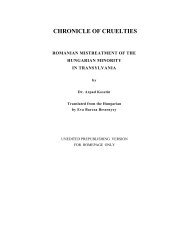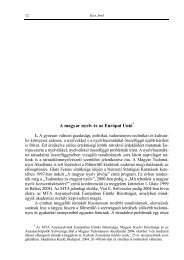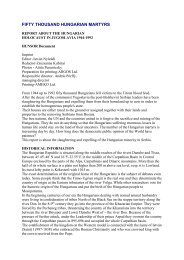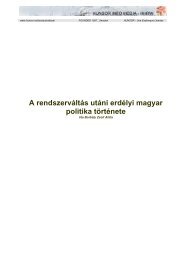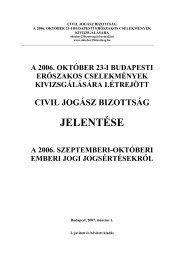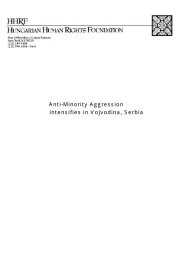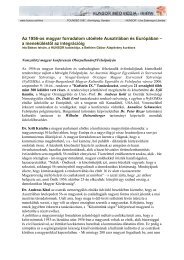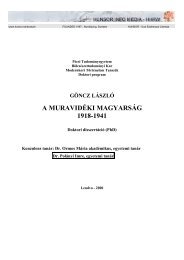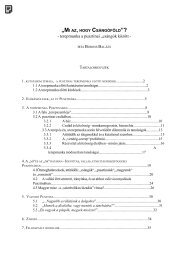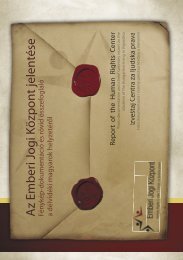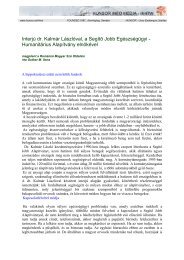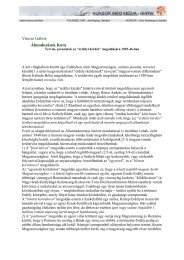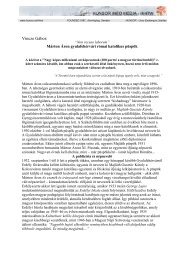PLEASE NOTE: This book contains graphic description ... - HUNSOR
PLEASE NOTE: This book contains graphic description ... - HUNSOR
PLEASE NOTE: This book contains graphic description ... - HUNSOR
Create successful ePaper yourself
Turn your PDF publications into a flip-book with our unique Google optimized e-Paper software.
The accused did not make use of his court against these murders, but commissioned theprincipal criminal, General Czeydner, whose reports seemed more powerful in his eyes than anyproof. His unconditioned belief in the reliability of a general, originating from the military castesolidarity, brought the result of horrible death of thousands of innocent people including womenand children.Months later he initiated a court-martial against the murderers, but as early as August he hadalready stopped the proceedings against them. Some of them including Grassy, he put up forpromotion regardless of the outcome of a possible trial. After eighteen months, submitting tooutward pressure, he is forced to initiate the procedure again through his court. In spite of hisprosecutors repeated proposal he denies the arrests and they all escaped to Germany, who maywell be said to stand on the same level of morality. The accused commemorated the horriblecrime in a melancholy officer's order of the day, regarding it this time as a national catastrophe.Up to that time, he had regarded the raid as152the brave and heroic deed of the Hungarian soldier. <strong>This</strong> fundamental switch of conviction aftereighteen months was due only to the murderers' escape .All these facts concerning the accused, the National Council has already consideredagainst him, and included them in the war crime defined under the first article of the P.C.,paragraph 11. Although they do not share the characteristics of the direct action carried out withthe purpose explicit in the quoted article, they were in connection with it. Originating from auniform volition, the behaviour of the accused realized the war crime in some of its details wasevaluated as belonging to the same ideological circle."A Yugoslavian delegation, whose responsible jurist member was Dr. VladimirGavrilovics, solicitor from Novi Sad, exercised political pressure and referred it to theapproaching peace-negotiations. They demanded the extradition of Ferenc Szombathelyi and theprincipal criminals, who were already condemned in the case of the raids at Novi Sad for thepurpose of a local Yugoslavian legal proceedings.<strong>This</strong> Vladimir Gavrilovics was the counsel of the wealthy Serb landowner andindustrialist Gyorgy Dungyerszky in Bacska. He was the man, who had rescued the Nabob'sfamily in January 20, 1942, following an order by telephone from Novi Sad. He had taken themto Budapest, forgetting about his own family. He had not been warned of the imminent dangerand all his relatives apart from his old father fell victim to the bloodshed. In the demand for theculprits, the thirst for direct revenge brought extraordinarily strong arguments, although they hadalready received their final verdict; the severest metted out. They argued that "The decision ofthe Hungarian judicial authorities will have influence on the outcome of the approaching peacenegotiations!" .Obviously this has been one of the most important arguments that the Hungarianauthorities yielded.The victorious powers signed the peace treaty with the Hungarians or forced the treaty onthe Hungarians at the Paris Peace Conference on August 24, 1946.Our Foreign Minister, Janos Gyongyosi, and the members of the Hungarian delegationmade and expressed wishes only in relation with the population and territories of



